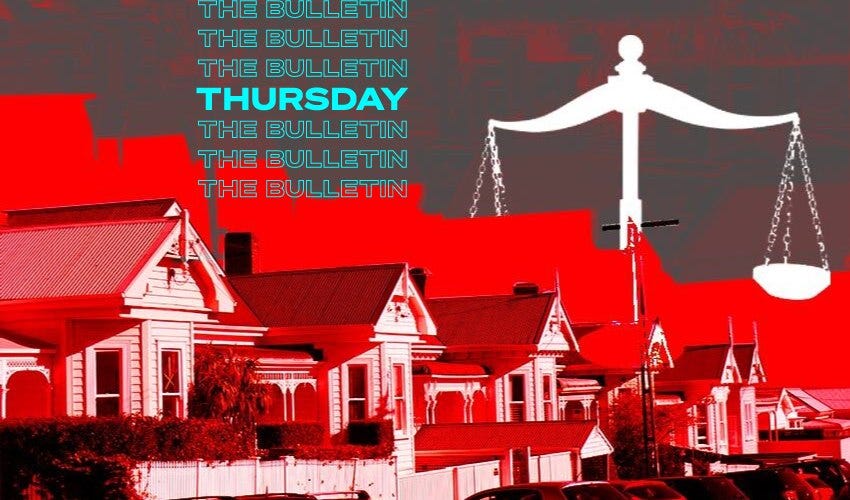‘It’s a housing catastrophe’
The Salvation Army’s latest state of the nation report warns that the problems facing vulnerable New Zealanders are urgent and worsening
Mōrena and welcome to The Bulletin for Thursday, February 17, by Justin Giovannetti. Presented in partnership with Z Energy.
In today’s edition: Seymour meets with protest leaders; a new Covid record; Australia to broaden deportation law; but first, a dire warning from the Salvation Army.
When does a housing crisis turn into a catastrophe? (Image: Tina Tiller)
It’s no longer a housing crisis, it’s a catastrophe. Two years into the pandemic, the Salvation Army is warning in its annual state of the nation report that vulnerable New Zealanders are in a more precarious position than ever. The report’s dashboard is a sobering read, with 17 of 25 indicators either deteriorating over the past year or not improving. Housing led the decline, with the charity warning that the country’s fast increasing housing costs and rents should now be rightly called a “catastrophe”. Explaining its language, the charity said it needs to reflect what it sees in communities around Aotearoa. That’s what makes this report unique, it’s written by the people on-the-ground working with New Zealanders most in need.
“A lot of families were already living on the edge when Covid-19 hit our country,” said Lt Col Ian Hutson, the Salvation Army’s director of social policy. “The pandemic not only pushed some of them over the edge, but also increased the vulnerability of others, pulling them closer to desperation.”
A time of great suffering. It takes very little searching to find a number of voices in New Zealand who don’t believe a housing crisis exists. They often dismiss it as whinging millennials or envy from those who aren’t in the market. With the average home in Auckland now worth 35 times the median income, those views aren’t backed by the economic reality. The Economist (soft paywall), a newspaper without any socialist inclination, wrote on the weekend about New Zealand’s worsening housing crisis and put it in a global perspective.
The new label. As Stuff writes, people in New Zealand have become increasingly “desensitised” to the talk of a housing crisis. So the Salvation Army decided to endorse urgency and “elevate the discussion” by calling it a catastrophe instead. There are now more than 25,000 applicants on the social housing waitlist and once temporary stays in motels are increasingly lasting over half a year. A crisis is generally defined as a time of intense trouble. What do you call it when the trouble continues to intensify and worsen year after year? I’d love your thoughts.
There are some positives and signs of hope. A decline in teenage pregnancies that began 14 years ago continues, with abortions down 70% since 2008. Youth offending rates are also down. The biggest area of improvement, responsible for fully half the good news in the report, is around work and incomes. Unemployment is at a record low, while the number of people working is up sharply since Covid-19 hit. Incomes are also rising as minimum wages continue to rise. However, that last positive point should have a question mark added to it now. As one of the report’s authors told NewstalkZB, the spike in inflation over the last months of 2021 means that many households are now worse off as their salaries buy less.
One of the indicators that hasn’t improved is child poverty. There are now 209,000 children in New Zealand living in a home that needs a benefit. That’s one in five children. The indicator is marked as “no change” in the report. That’s because an additional 21,000 children were pushed into poverty at the start of Covid-19 and despite more people in work, very few of those children are in households that have pulled out of poverty. “In some way we’ve all failed,” a policy analyst told Breakfast about the report’s finding.
A message from editor Madeleine Chapman
Times are tough for a lot of people at the moment. The Spinoff is both experiencing the pinch and working hard to tell the stories from every sector. If you aren't in a position to make a contribution right now, ask your boss to consider an organisation membership.
Share the load and help us continue telling stories from all around Aotearoa, contact us today for more info on how to donate as an organisation.
David Seymour faces rebuke after meeting with protest leaders. The Act leader became the first MP to meet with protesters outside parliament, earning the condemnation of Jacinda Ardern and Christopher Luxon. Both leaders told One News they won’t meet with the protest after two weeks of threats and the violation of Wellingtonians’ freedom. Seymour said the worst elements of the protest were dispersing, but offered no evidence of the claim. More than 24 hours after a police ultimatum to remove vehicles blocking Wellington’s streets, no cars have been towed. Protesters in Picton have also refused an order to move while tensions are growing in Christchurch.
The police have a growing ‘credibility gap’ as protests continues. Stuff’s Henry Cooke has written the latest column pointing out that police can’t keep making empty threats and unenforced ultimatums. Each time, the protest grows in size. For all the talk of negotiations, the (more sensible) protesters have made it very clear what they want: An immediate end to all Covid-19 rules. There’s no clear solution other than one involving police.
Otago schoolgirl tells her story after Islamophobic attack. Hoda Al-Jamaa was sitting with friends at Otago Girls’ High School when three girls ripped her hijab off and beat her. She ended up in hospital with a concussion. As RNZ reports, the attack was filmed by one of the students and has been shared widely around the school. Al-Jamaa said she’s reluctant to go back to school. There’s footage of the attack and the details were confirmed by police. After first refusing to comment, the school’s principal eventually sent a written statement where she said administrators were trying to “work through to understand every side of every story”. The attack happened a week ago.
The first four digit day of Covid. A record 1,160 community cases were reported yesterday as the omicron outbreak grows. RNZ has the details as director-general of health Ashley Bloomfield unveiled yesterday how home-isolation and do-it-yourself contact tracing is now operating under phase two. The Spinoff’s Covid data tracker has the latest figures.
A remix on 90s nostalgia TV is here thanks to our partners at TVNZ. Will Smith’s comedic journey from the streets of Philadelphia to the gated mansions of Bel-Air was a staple of the 90s TV diet. Now, in a reworked modern version of The Fresh Prince of Bel-Air, Smith's life is given a deeper, more serious twist. Bel-Air promises reimagined versions of all our favourite characters—what does Hilary Banks’ character look like in the age of social media? How is Carlton’s pompousness reflected in today's political climate? It's the fresh prince as we’ve never seen him before, and you can watch it now on TVNZ On Demand.
Australian Labor drops opposition to wider deportation bill. Nearly a year after Jacinda Ardern last told Australia’s prime minister to stop deporting his people and his problems, The Sydney Morning Herald reports that the country’s deportation programme is being expanded. The immigration minister will have wider powers to deport more people under the proposed law, including those convicted of low-level offences. Labor had opposed the bill because of its corrosive impact on the trans-Tasman relationship. The Guardian reported on a case earlier this week where a New Zealander who has lived in Australia for 40 years faced deportation for a fraud conviction. A tribunal quashed the deportation order and called the man a “model citizen.” The new law reduces the pathway to an appeal.
Reports of Russian troops pulling back from Ukraine’s border, as NZ voices concern. Foreign minister Nanaia Mahuta called her counterpart in Kyiv to express New Zealand’s “deep concern” about the unprecedented military buildup on the country’s border. According to Newshub, she reiterated Wellington’s commitment to Ukraine’s territorial integrity. That’s a strong diplomatic show of support on the same day there were reports some of the 150,000 Russian troops on the border had withdrawn. Reuters reports the US president made another appeal to the Russians to avoid a needless and costly war in Europe.
Got some feedback about The Bulletin, or anything in the news?
Get in touch with me at thebulletin@thespinoff.co.nz
Right now on The Spinoff: Shanti Mathias reports from an Auckland NFT party that sounds like pure chaos. Madeleine Chapman investigates claims anti-mandate protesters stole rubber mats from a Wellington skate park (very likely). Madeleine Holden digs in to understand why pregnancy scans in NZ cost hundreds of dollars. Chris Schulz speaks with the owner of an ice cream shop that hasn’t survived omicron. Aaron Hendry writes that the conversion therapy ban is only the start of the struggle for rainbow communities.
A new beginning for Super Rugby. Moana Pasifika and Fijian Drua could shake up Super Rugby Pacific at a time when the southern hemisphere competition needs help. RNZ writes that after two years of Covid-19 disruptions and lopsided play between teams from New Zealand and Australia, there’s hope for improvement this year. The punters have their money on a Crusaders win and a strong showing from the Chiefs.







